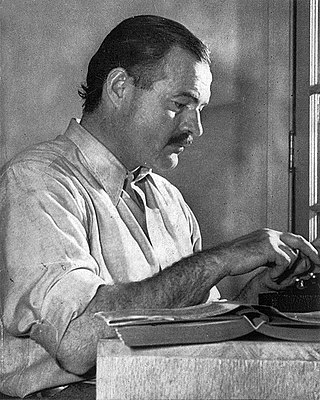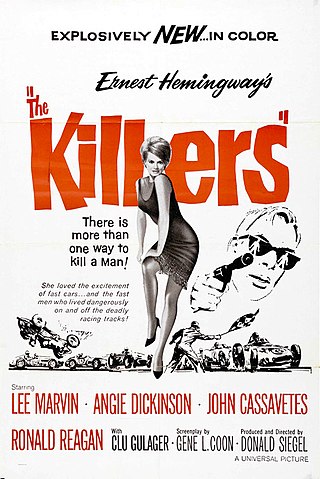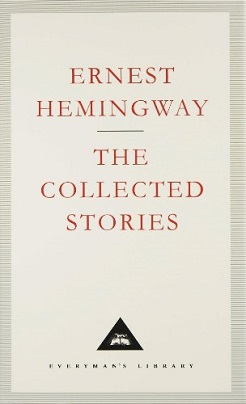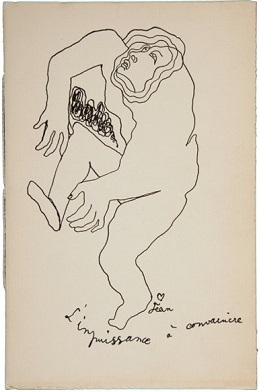Related Research Articles

Ernest Miller Hemingway was an American novelist, short-story writer, and journalist. His economical and understated style—which included his iceberg theory—

The Sun Also Rises is the first novel by American writer Ernest Hemingway. It portrays American and British expatriates who travel along the Camino de Santiago from Paris to the Festival of San Fermín in Pamplona and watch the running of the bulls and the bullfights. An early modernist novel, it received mixed reviews upon publication. Hemingway biographer Jeffrey Meyers writes that it is now "recognized as Hemingway's greatest work" and Hemingway scholar Linda Wagner-Martin calls it his most important novel. The novel was published in the United States in October 1926 by Scribner's. A year later, Jonathan Cape published the novel in London under the title Fiesta. It remains in print.
"Hills Like White Elephants" is a short story by Ernest Hemingway. It was first published in August 1927, in the literary magazine transition, then later in the 1927 short story collection Men Without Women. Later the story was adapted for film in 2002. "Hills Like White Elephants" is a short 38-minute film; British actor Greg Wise played The American.
"The Killers" is a short story by Ernest Hemingway, first published in Scribner's Magazine in 1927 and later republished in Men Without Women,Snows of Kilimanjaro, and The Nick Adams Stories. Set in 1920s Summit, Illinois, the story follows recurring Hemingway character Nick Adams as he has a run-in with a pair of hitmen, who are seeking to kill a boxer, in a local restaurant.

Green Hills of Africa is a 1935 work of nonfiction by American writer Ernest Hemingway. Hemingway's second work of nonfiction, Green Hills of Africa is an account of a month on safari he and his wife, Pauline Marie Pfeiffer, took in East Africa during December 1933. Green Hills of Africa is divided into four parts: "Pursuit and Conversation", "Pursuit Remembered", "Pursuit and Failure", and "Pursuit as Happiness", each of which plays a different role in the story.

Across the River and Into the Trees is a novel by American writer Ernest Hemingway, published by Charles Scribner's Sons in 1950, after first being serialized in Cosmopolitan magazine earlier that year. The title is derived from the last words of U.S. Civil War Confederate General Thomas J. "Stonewall" Jackson: “Let us cross over the river and rest under the shade of the trees.”

The Complete Short Stories of Ernest Hemingway: The Finca Vigía Edition, is a posthumous collection of Ernest Hemingway's short fiction, published in 1987. It contains the classic First Forty-Nine Stories as well as 21 other stories and a foreword by his sons.

The Killers is a 1964 American neo noir crime film. Written by Gene L. Coon and directed by Don Siegel, it is the second Hollywood adaptation of Ernest Hemingway's 1927 short story of the same name, following the 1946 version.

"Soldier's Home" is a short story by Ernest Hemingway. It was included in the 1925 Contact Collection of Contemporary Writers and published by Boni & Liveright in Hemingway's 1925 New York collection short stories, In Our Time.

Men Without Women (1927) is the second collection of short stories written by American author Ernest Hemingway. The volume consists of 14 stories, 10 of which had been previously published in magazines. It was published in October 1927, with a first print-run of approximately 7600 copies at $2.

The iceberg theory or theory of omission is a writing technique coined by American writer Ernest Hemingway. As a young journalist, Hemingway had to focus his newspaper reports on immediate events, with very little context or interpretation. When he became a writer of short stories, he retained this minimalistic style, focusing on surface elements without explicitly discussing underlying themes. Hemingway believed the deeper meaning of a story should not be evident on the surface, but should shine through implicitly.
"The Capital of the World" is a short story by American writer Ernest Hemingway. The story takes place in Madrid and follows Paco, a young waiter apprentice, and his desire to become a matador.

"Big Two-Hearted River" is a two-part short story written by American author Ernest Hemingway, published in the 1925 Boni & Liveright edition of In Our Time, the first American volume of Hemingway's short stories. It features a single protagonist, Hemingway's recurrent autobiographical character Nick Adams, whose speaking voice is heard just three times. The story explores the destructive qualities of war which is countered by the healing and regenerative powers of nature. When it was published, critics praised Hemingway's sparse writing style and it became an important work in his canon.

Ernest Hemingway: The Collected Stories is a posthumous collection of Hemingway's short fiction, published in 1995. Introduced by James Fenton, it is published in the UK only by Random House as part of the Everyman Library. The collection is split in two parts.

"Cat in the Rain" is a short story by American author Ernest Hemingway (1899-1961), first published by Richard Hadley of Boni & Liveright in 1925 in the short story collection In Our Time. The story is about an American man and wife on vacation in Italy. Critical attention focuses chiefly on its autobiographical elements and on Hemingway's "theory of omission".

Hemingway's Adventures of a Young Man is a 1962 American adventure film directed by Martin Ritt based on Ernest Hemingway's semi-autobiographical character Nick Adams, and featuring Richard Beymer as Adams. A.E. Hotchner wrote the screenplay, originally calling the film Ernest Hemingway's "Young Man". The cast includes Diane Baker, Jessica Tandy, Ricardo Montalbán, Eli Wallach, Arthur Kennedy and Paul Newman. It was released in July 1962.

"Indian Camp" is a short story written by Ernest Hemingway. The story was first published in 1924 in Ford Madox Ford's literary magazine Transatlantic Review in Paris and republished by Boni & Liveright in Hemingway's first American volume of short stories In Our Time in 1925. Hemingway's semi-autobiographical character Nick Adams—a child in this story—makes his first appearance in "Indian Camp", told from his point of view.
"A Simple Enquiry" is a short story written by Ernest Hemingway. It was published in 1927 in the collection Men Without Women and is notable for its focus on homosexuality.

"Out of Season" is a short story written by Ernest Hemingway, first published in 1923 in Paris in the privately printed book, Three Stories and Ten Poems. It was included in his next collection of stories, In Our Time, published in New York in 1925 by Boni & Liveright. Set in Cortina d'Ampezzo, Italy, the story is about an expatriate American husband and wife who spend the day fishing, with a local guide. Critical attention focuses chiefly on its autobiographical elements and on Hemingway's claim that it was his first attempt at using the "theory of omission".

Today is Friday is a short, one act play by Ernest Hemingway. The play was first published in pamphlet form in 1926 but became more widely known through its subsequent publication in Hemingway's 1927 short story collection, Men Without Women. The play is a representation of the aftermath of the crucifixion of Jesus, in the form of a conversation between three Roman Soldiers and a Hebrew bartender. It is one of the few dramatic works written by Hemingway.
References
- 1 2 Hemingway's Puzzling Pursuit Race Nolan, Charles J. Jr., Studies in Short Fiction, vol. 34, no. 4, fall 1997, p. 481. Retrieved 29/9/2022.
- ↑ Reflections on Ernest Hemingway Retrieved 30/9/2022.
- ↑ Hemingway, the figure of the bicycle, and avant-garde Paris Retrieved 30/9/2022.
- ↑ Film Review Retrieved 30/9/2022.